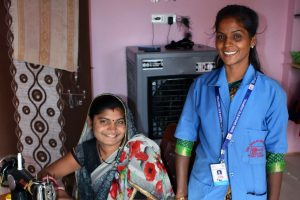Join a powerful, unprecedented alliance for better eye health for all.
Join IAPB-
Choose an alternate language here
Women play a critical role in the advancement of global health, both in formal roles and informally within their families and communities. but men continue to hold the majority of leadership positions. Women make up 75 percent of the global healthcare workforce, yet occupy less than 25 percent of the most influential leadership positions.[1]
Globally, women experience a disproportionate burden of disease and death due to inequities in access to basic health care, nutrition and education.[2] Women’s leadership in global health is essential to address these inequities, because women know first-hand the unique barriers women and girls face when accessing health resources. Therefore, they need to be involved in decision-making processes in addressing these gaps in health provision.
Shortly after COVID-19 was declared a pandemic, United Nations Secretary General António Guterres urged governments to put women and girls at the centre of their efforts.[3]
“That starts with women as leaders, with equal representation and decision-making power…Gender equality and women’s rights are essential to getting through this pandemic together, to recovering faster, and to building a better future for everyone.” – António Guterres
In Kenya, our Country Manager Alice Mwangi provides overall strategic direction and leadership for our Kenyan programmes. Alice is a public health specialist with a wealth of experience in developing, managing and implementing programmes. In her role, she develops valuable partnerships with hospitals, the Ministries of Health and Education and other non-profit organizations. These relationships are essential for implementing our flagship Hospital-Based Community Eye Health model.
Women have been bearing the brunt of COVID-19 around the world.[4] Alice knows first-hand that it is important to empower women to become catalysts of change to address health issues and create a lasting impact. Under her leadership, our COVID-19 response in Kenya focused on training female community health volunteers to provide critical health information to their communities. In total, these community health volunteers provided health education on COVID-19 to 602,366 individuals.
Globally, 55 percent of people experiencing vision loss are women or girls.[5] This is partially because women tend to live longer than men and are therefore at a higher risk of age-related eye health issues such as macular degeneration. In many of the countries where we work however, women face more barriers than men when accessing eye health services.

Because of this, Pinky has become an inspiration to many young girls in her village. They look up to her for her tireless work ethic and independence. She says she finds her work so rewarding that she hopes that her daughter will one day also choose to work in the eye health sector. Pinky and many other female community health leaders like her are helping move the dial on eye health inequity.
In celebration of #IWD2021, we #ChooseToChallenge inequities in eye health and support female leadership in global health.
This can also be found on OEU website.
[1] https://www.lshtm.ac.uk/research/research-action/women-leaders-global-health
[2] https://www.ncbi.nlm.nih.gov/pmc/articles/PMC4167801/
[3] https://www.unwomen.org/en/news/stories/2020/4/statement-sg-put-women-and-girls-at-the-centre-of-efforts-to-recover-from-covid19
[4] https://news.un.org/en/story/2020/09/1071502
[5] https://www.iapb.org/learn/vision-atlas/inequality-in-vision-loss/gender/